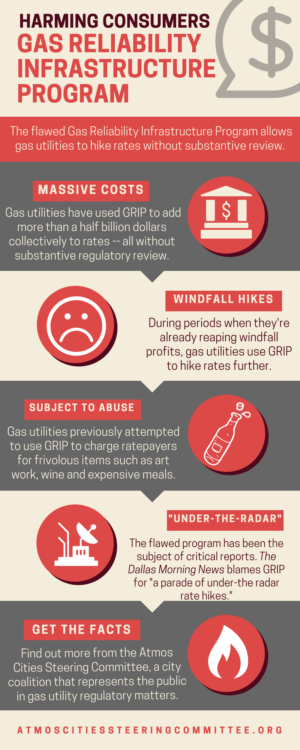 Customers served by one of the state’s largest gas utilities will soon see their bills increase thanks to a decision this week by the Texas Railroad Commission.
Customers served by one of the state’s largest gas utilities will soon see their bills increase thanks to a decision this week by the Texas Railroad Commission.
Under that decision Atmos Pipeline Texas — a regulated monopoly serving northern and western parts of the state — will begin collecting about $30.7 million more each year. The Railroad Commission’s three elected commissioners also granted Atmos Pipeline Texas on Monday an 11.5 percent “return on equity,” or ROE, which is a rough proxy for its allowable profit levels.

ACSC General Counsel Geoffrey Gay
Geoffrey Gay, ACSC general counsel, said the return on equity level and the overall rate increase are excessive given the company’s status as an extremely low-risk monopoly. “As the investor owned utility in Texas with the most risk-reducing features, (the company) should have among the lowest authorized ROE of public utilities — instead, (it) has the highest,” wrote Gay, in an ACSC legal brief filed earlier this month.
The ACSC general counsel also noted that Atmos Pipeline’s latest hike comes on top of numerous previous ones, that, taken cumulatively, totaled 17.5 percent since 2011. Each of those previous hikes were the result of a controversial program known as the Gas Reliability Infrastructure Program that has allowed Atmos Pipeline Texas and other gas utilities to hike rates on an annual basis with almost no regulatory review.
In a recent investigative report, the Houston Chronicle also found that the GRIP program has allowed gas utilities like Atmos Pipeline Texas to increase rates even when those monopoly companies were simultaneously earning windfall profits off their captive customers.
In 2013, for instance, the commission approved a rate increase for Atmos customers when the company over earned by around $4 million, according to the newspaper. Then, in 2015, the commission approved another rate increase when the company had over earned by about $1.6 million, the paper reported.
You can read the Houston Chronicle report here. For more about the GRIP program, check out this ACSC report from 2010.
